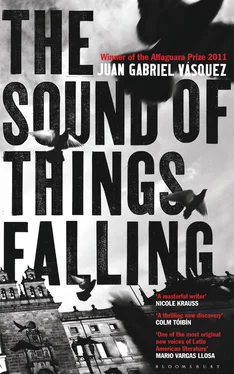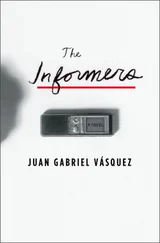What I do remember about that day is that he didn’t strike me as intimidating: he was so thin that he seemed taller than he actually was, and you had to see him standing beside a cue to see that he was barely five foot seven; his thin mousy hair and his dried-out skin and his long, dirty nails gave an impression of illness or laziness, like land gone to waste. He’d just turned forty-eight, but he looked much older. Speaking seemed to be an effort for him, as if he couldn’t get enough air; his hand was so unsteady that the blue tip of his cue always trembled in front of the ball, and it was almost miraculous that he didn’t scratch more often. Everything about him seemed tired. One afternoon, after Laverde had gone, one of the guys he’d been playing with (a man around the same age but who moved better, who breathed better, who is undoubtedly still alive today and perhaps even reading this memoir) told me the reason without my having asked. ‘It’s prison,’ he told me, revealing as he spoke the brief sparkle of a gold tooth. ‘Jail tires a person out.’
‘He was in prison?’
‘Just got out. He was in there for something like twenty years, so they say.’
‘And what’d he do?’
‘Oh, that I don’t know,’ the man said. ‘But he must have done something, no? Nobody gets that many years for nothing.’
I believed him, of course, because nothing allowed me to think there was an alternative truth, because there was no reason at that moment to question that first innocent and ingenuous version that someone gave me of Ricardo Laverde’s life. I thought how I’d never known an ex-convict before — the expression ex-convict , anyone would notice, is the best proof of that — and my interest in getting to know Laverde grew, or my curiosity grew. A heavy sentence always impresses a young man like I was back then. I calculated that I was barely walking when Laverde went to prison, and no one can be invulnerable to the idea of having grown up and gone to school and discovered sex and maybe death (that of a pet and then a grandfather, for example), and having had lovers and suffered painful break-ups and come to know the power of deciding, the satisfaction or regret resulting from decisions, the power to hurt and the satisfaction or guilt in doing so, and all this while a man lives the life without discoveries or apprenticeships that invariably results from a sentence of such length. A life unlived, a life that runs through one’s fingers, a life one suffers through while knowing that it belongs to someone else: to those who don’t have to suffer.
And almost without my noticing we began to approach each other. At first it happened by chance: I applauded one of his cannons, for example — the man had a knack for shots off the cushion — and then I invited him to play at my table or asked for permission to play on his. He accepted reluctantly, as an initiate receives a novice, in spite of the fact that I was a better player than him and that by teaming up with me Laverde could, at last, stop losing. But then I discovered that losing didn’t matter much to him: the money he put down on the emerald-coloured felt at the end of a game, those two or three dark and wrinkled notes, was part of his daily expenditure, a debit already accepted in his budget. Billiards was not a pastime for him, or even a competition, but rather the only way Laverde had at that moment of being in society: the sound of the balls hitting each other, of the wooden counters on the scoreboard, of the blue chalk rubbing against the old leather cue tips, all this made up his public life. Outside those corridors, without a billiard cue in his hand, Laverde was unable to have a normal conversation, let alone a relationship. ‘Sometimes I think,’ he told me the only time we talked somewhat seriously, ‘I’ve never looked anyone in the eye.’ It was an exaggeration, but I’m not sure the man was exaggerating on purpose. After all, he wasn’t looking me in the eye when he said those words.
Now that so many years have passed, now that I remember with the benefit of an understanding I didn’t have then, I think of that conversation and it seems implausible that its importance didn’t hit me in the face. (And I tell myself at the same time that we’re terrible judges of the present moment, maybe because the present doesn’t actually exist: all is memory, this sentence that I just wrote is already a memory, this word is a memory that you, reader, just read.) The year was coming to an end; it was exam time and classes were finished; the routine of billiards had settled into my days, and somehow given them shape and purpose. ‘Ah,’ Ricardo Laverde said each time he saw me arrive, ‘you almost missed me, Yammara. I was just about to leave.’ Something in our encounters was changing: I knew it the afternoon Laverde didn’t say goodbye the way he always did, from the other side of the table, bringing his hand up to his forehead like a soldier and leaving me with my cue in my hand, but waited for me, watched me pay for both our drinks — four coffees with brandy and a Coca-Cola at the end — and walked out of the place beside me. He walked with me as far as the Plazoleta del Rosario, through exhaust fumes and the smell of fried arepas and open sewers; then, where a ramp descends into the dark mouth of an underground car park, he gave me a pat on the back, a fragile little pat from his fragile hand, closer to a caress than a farewell, and said, ‘OK, see you tomorrow. I’ve got an errand to run.’
I saw him dodge the huddles of emerald sellers and head down a pedestrian alley that leads into 7th Avenue, then turn the corner, and then I couldn’t see him any more. The streets were starting to be adorned with Christmas lights: Nordic wreaths and candy canes, English words, silhouettes of snowflakes in this city where it’s never snowed and where December, in particular, is the sunniest time of year. But in the daytime unlit lights do not adorn: they obstruct, sully and contaminate the view. The wires, suspended over our heads, crisscrossing the road from one side to the other, were like hanging bridges and in Bolívar Plaza they climbed the posts, the Ionic columns of the Capitol and the walls of the cathedral like ivy. The pigeons did have more wires to rest on, it’s true, and the corn vendors couldn’t keep up with the tourists who wanted to feed them, and the street photographers couldn’t keep up with demand for their services either: old men in ponchos and felt hats who seized their clients as if they were driving cattle and then, at the moment of the photo, ducked under a black cloth, not because the machine demanded it, but because their clients expected it. These photographers were also throwbacks to other times, before everybody could take their own portraits and the idea of buying a photo in the street that someone else had taken (often without them noticing) wasn’t completely absurd. Every Bogotá resident of a certain age has a street photo, most of them taken on 7th Avenue, formerly calle Real del Comercio, or Royal Commerce Street, queen of all Bogotá streets; my generation grew up looking at those photos in family albums, those men in three-piece suits, those women with gloves and umbrellas, people from another time when Bogotá was colder and rainier and tamer, but no easier. I have among my papers the photo my grandfather bought in the 1950s and the one my father bought fifteen or so years later. I don’t have, however, the one Ricardo Laverde bought that afternoon, although the image remains so clearly in my memory that I could draw every line of it if I had any talent for drawing. But I don’t. That’s one of the talents I don’t have.
So that was the errand Laverde had to run. After leaving me he walked to Bolívar Plaza and had one of those deliberately anachronistic portraits taken, and the next day he arrived at the billiard club with the result in his hand: a sepia-toned piece of paper, signed by the photographer, on which appeared a less sad or taciturn man than usual, a man of whom it might be said, if the evidence of the past few months didn’t convert the appraisal into an impudence, that he was content. The black plastic cover was still on the table, and Laverde put the image on top of it, his own image, and stared at it in fascination: his hair was combed, not a wrinkle in his suit, his right hand extended and two doves pecking at his palm; behind him you could almost make out the gaze of a couple of passers-by, both in sandals with rucksacks, and in the background, beside a corn cart enlarged by the perspective, the Palace of Justice.
Читать дальше












